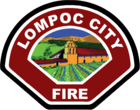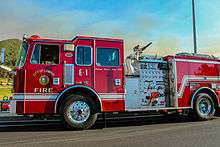Lompoc Fire Department
The Lompoc Fire Department (LFD) provides fire protection and emergency medical services for Lompoc, California. The department's primary response area is approximately 12 square miles (31 km2) and includes the Lompoc Penitentiary.[3]
 | |
| Operational area | |
|---|---|
| Country | |
| State | |
| City | Lompoc |
| Agency overview[1] | |
| Established | 1875 |
| Annual calls | 4,230 (2015) |
| Employees | 30 |
| Annual budget | $8,432,734 (2013-15) Biennial |
| Staffing | Career |
| Fire chief | Gerald Kuras |
| EMS level | Basic Life Support |
| IAFF | 1906 |
| Facilities and equipment[2] | |
| Divisions | 3 |
| Battalions | 1 |
| Stations | 2 |
| Engines | 2 - Type 1 frontline 1 - Type 1 reserve |
| Quints | 1 |
| Rescues | 1 |
| HAZMAT | 1 |
| USAR | 1 - Type: Medium |
| Wildland | 1 - Type 3 frontline 1 - Type 3 reserve |
| Website | |
| Official website | |
| IAFF Facebook | |
Mission statement
The Lompoc Fire Department is dedicated to serving the community of Lompoc by providing the highest level of emergency/rescue services, hazard prevention, and safety education, ensuring the protection of life, property and environment. Above all else, we realize that we are here to meet the needs of the public. We conduct ourselves at all times in a manner befitting the oath we swore to uphold, and treat others as they desire to be treated.[4]
History
According to the Lompoc Journal archives (now Lompoc Record), the first organized fire protection in the Lompoc colony was formed on August 31, 1875.[5] The first "Fire Company or Hook and Ladder Company" was an all volunteer fire brigade organized 13 years before Lompoc became a city. H.R. Fabing was elected foreman of the Fire Company, making him Lompoc's first unofficial fire chief.[4]
During this era, volunteer firefighters were alerted to the presence of a fire with the use of a large fire bell that rang. Firefighters would then report to the fire station and pick up the necessary equipment before heading to the emergency. Firefighters used buckets of waters to extinguish the fire since mechanical firefighting equipment wasn't in heavy use yet.[4] In 1893, a new and much larger fire bell was purchased from the W.T. Garatt & Company. The bell still resides outside of Fire Station 1 as a remembrance of the department's history.
On October 4, 1888, the Town of Lompoc's board of trustees approved Ordinance No. 16, defining the "Fire Limits of the Town of Lompoc to Protect LIfe and Property from Fire and Fixing the Penalty for Non-Observance Thereof."[6] The town's marshal was entrusted to enforce the ordinance since the existing fire company was a private entity.
In 1891 money was allocated for the building of a combined city hall and fire department. The bottom half served as the fire department, while the upper floors were utilized as a combination City Hall and meeting area. The building was made of brick and located at 115 South G Street. This building served as "Station 1" and administrative headquarters until 1978, when it was torn down and rebuilt as the existing fire headquarters.[4]
On May 12, 1916, the residence of A.L. Jacobs was destroyed by fire. The Lompoc Journal reported the next week, on May 19, 1916: "The idea which will be presented at Monday's meeting will be the suggestion that chief be elected and a company organized, each member of which is to be assigned some special duty, thus making every move at a fire count."[7]
On June 2, 1916, Charles Everett was elected as chief engineer (fire chief) of the volunteer fire department.[8] Chief Everett served as Lompoc's fire chief from 1916 until 1950, when he had to retire due to a heart condition. In honor of Chief Everett, a special mural was commissioned to local artists Pat and Robert Saul. The mural is taken from a 1923 family photograph of Charles Everett and his three-year-old son Ed in front of the fire house on a 1922 Seagrave fire engine.[9]
Stations and apparatus
| Station | Address | Engine | Truck | EMS | Wildland | Command | Specialty Response |
|---|---|---|---|---|---|---|---|
| 1 | 115 South G Street | Engine 1 | Truck 1 | Rescue 1 | Engine 310 Engine 311 (reserve) | Battalion Chief 301, 302, 303 | HazMat Trailer USAR (Medium) |
| 2 | 1100 North D Street | Engine 2 Engine 3 (reserve) | |||||
Type 1 Engines

Engine 1, Engine 2 and Engine 3 are both urban firefighting engines. Engines 1 and 2 are staffed full-time with: a captain, engineer and firefighter. Engine 3 is typically used as a reserve apparatus, though it is up-staffed on occasion for anticipated periods of high call volume (i.e. Independence Day and Special Events). All engines carry 500 US gallons (1,900 l) of water and 60 US gallons (230 l) of foam concentrate (Class A: 30 US gallons (110 l) / Class B: 30 US gallons (110 l)). Engines 1 and 3 are outfitted with a 1,250 US gallons per minute (4,700 L/min) single-stage pump, while Engine 2 has a 1,500 US gallons per minute (5,700 L/min) GPM single-stage pump.
Type 3 Engine
Engine 310 and Engine 311 are designed for use with vegetation, wild land and brush fires. Unlike Type 1 engines, which are mainly designed for urban structural firefighting, Type 3 engines have a shorter wheel base and are typically 4-wheel drive, making them ideal for uneven or steep terrain.
In May 2014, Engine 310 was purchased to replace the aging Engine 311.[10] Engine 310 serves as the primary response apparatus for Type 3 incidents, while Engine 311 has been placed in reserve status.
Addition of Rescue 1
In 2013, the department added its first piece of response apparatus since 1960. Statistics dictated that the department didn't have a unit available for response an average of 15.17 percent of the time, while 25-30 percent of the department's calls for service were simultaneous while both Engine 1 and 2 were committed to other incidents.[11]
Rescue 1 is a Ford F-450 with a utility bed and skid-mount pump. In addition to the pump, Rescue 1 carries 200 US gallons (760 l) of water and 10 US gallons (38 l) of Class A foam concentrate. Rescue 1 is staffed full-time with 2 firefighters and responds to emergency medical incidents, traffic collisions, structure fires and any other incident where additional manpower is needed.
Aerial ladder truck
Truck 1 is cross-staffed with either on-duty personnel from Fire Station 1 or off-duty personnel who have been recalled. Truck 1 is a Simon-Duplex 75-foot (23 m) "quint", outfitted with a 1,500 US gallons per minute (5,700 L/min) two-stage pump and 500 US gallons (1,900 l) water tank.
Specialty operations
The LFD is a member of various specialty response units within Santa Barbara County. Along with providing equipment, the LFD maintains daily staffing that fulfills the roster requirements of each team.
Urban search and rescue
The LFD is typed as a "medium" USAR department and participates in the California Emergency Management Agency (CalEMA) Urban Search and Rescue program as a member of Regional Task Force 12 (RTF-12). The other departments that comprise the team, include: Santa Barbara County Fire Department, Santa Barbara City Fire Department, Montecito Fire Protection District, Carpinteria-Summerland Fire Protection District, Santa Maria Fire Department and Vandenberg Air Force Base.
Hazardous materials team
Hazardous materials (HazMat) incidents involve the release of dangerous chemicals (including nuclear and biological agents) that could cause the loss of life, destruction of property or harm the environment.[12] The LFD participates in the North Santa Barbara County multi-agency Hazardous Materials Team. The team also consists of members from the Santa Barbara County Fire Department and Santa Maria Fire Department.[13]
References
- Lompoc City Budget Document, 2013-2015
- "Welcome to the City of Lompoc!". cityoflompoc.com.
- 2010 Census Gazetteer File - Places - California. United States Census Bureau.
- "History of the Lompoc Fire Department 1875-2014". City of Lompoc. Retrieved 1 March 2015.
- "Our Fire Department". Lompoc Record. April 4, 1981.
- "Ordinance Approved". Lompoc Journal. October 11, 1888.
- "Fire Department To Be Organized". Lompoc Journal. May 19, 1916.
- "Chas. Everett Elected Fire Department Chief". Lompoc Journal. June 14, 1916. Retrieved 1 March 2015.
- "Lompoc's First Fire Chief". Pat and Robert Saul. Retrieved 1 March 2015.
- "City of Lompoc Budget" (PDF). City of Lompoc. July 1, 2013. Retrieved 1 March 2015.
- "Lompoc Fire Department Secures New Emergency Response Unit". Noozhawk. January 31, 2014. Retrieved 1 March 2015.
- "Hazardous Materials Response Team" (PDF). Santa Barbara County Fire Department. Retrieved 5 March 2015.
- "Hazardous Materials". City of Lompoc. Retrieved 5 March 2015.